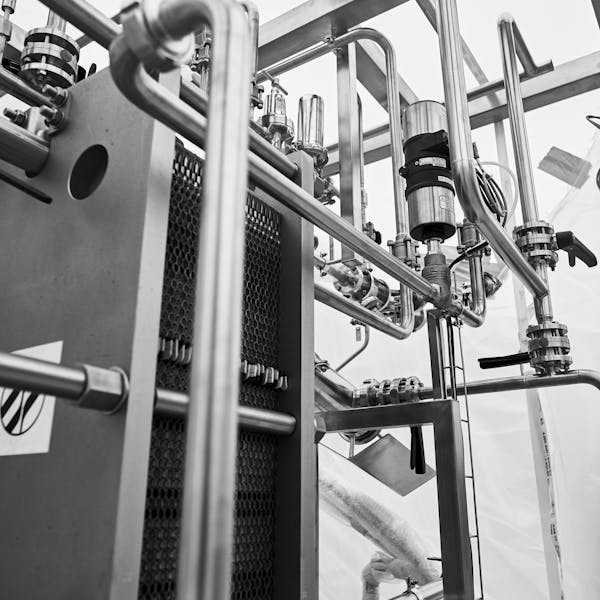Bedrock – Metal – Part 3
Metal
Metal is the third in a four-part series about the bedrock upon which Duration is built. Elements of Water, Wood, Metal and Stone reveal the pioneering technology built into our foundations to be true to our ethos of ‘beers that belong’. Read on to learn how our sense of place informs all we do.
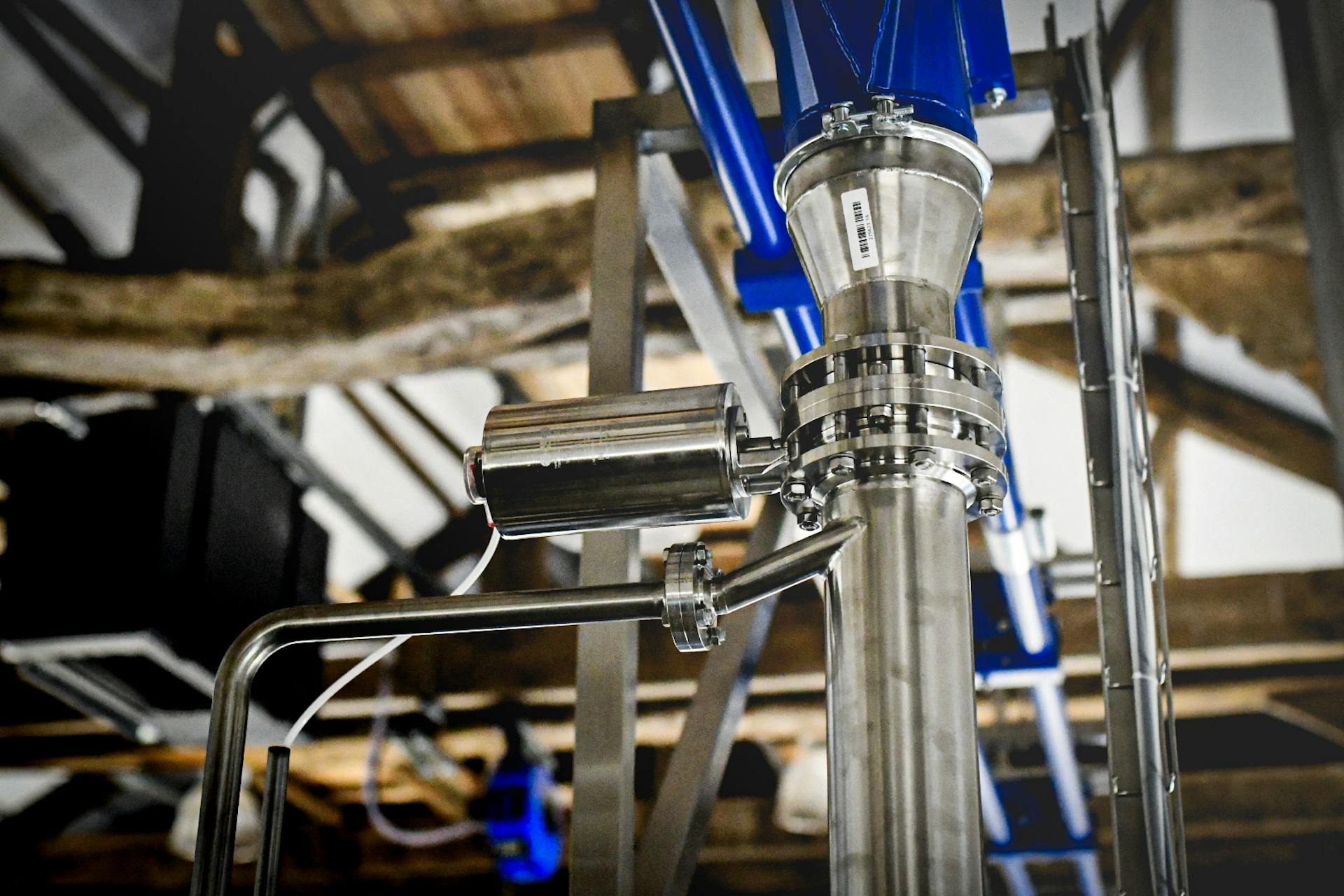
Of all of our bedrock none is more vital and essential than Metal. Water is our pride and purity, Wood our soul and our heart, Stone is our home and strength, and Metal is our marvel, the miraculous component that enables us to work. With Metal at the fore we possess an ability to consistently sculpt quality driven wort, which in turn give us the ability to make beautifully balanced, beers.
An iron will, nerves of steel, and a heart of gold. Many similes talk of the enduring strength and positive qualities of metal. Detailing and discussing how we gave ourselves the best possible brewing capabilities with our supplier selections this post covers two key pieces of our set up kit, the high-end German engineered BrauKon brewhouse installed and our American manufactured Codi counter-pressure canning line. We are the first UK brewery to commission a Codi line, expect lots more from these guys over here. For any coolship fans joining us, we covered this in our last post on Wood – though made in stainless steel our coolship use sits better alongside our wooden foeders and barrels.

Breweries come in all shapes and sizes, from ice bath home brew setups, to gravity-fed multi-story buildings – often full of copper vessels and pre refrigerated cooling contraptions, to burgeoning railway arches – shoehorned full of tanks and fold up furniture to rotate into a taproom when the brew day ends.
Amazing beers can be made on the most rudimentary equipment. But no matter how great a brewer or their recipe, poor equipment can lay asunder to the best efforts. Conversely, great equipment with no creative drive or ambition can lead to the dullest and most unimaginative beers
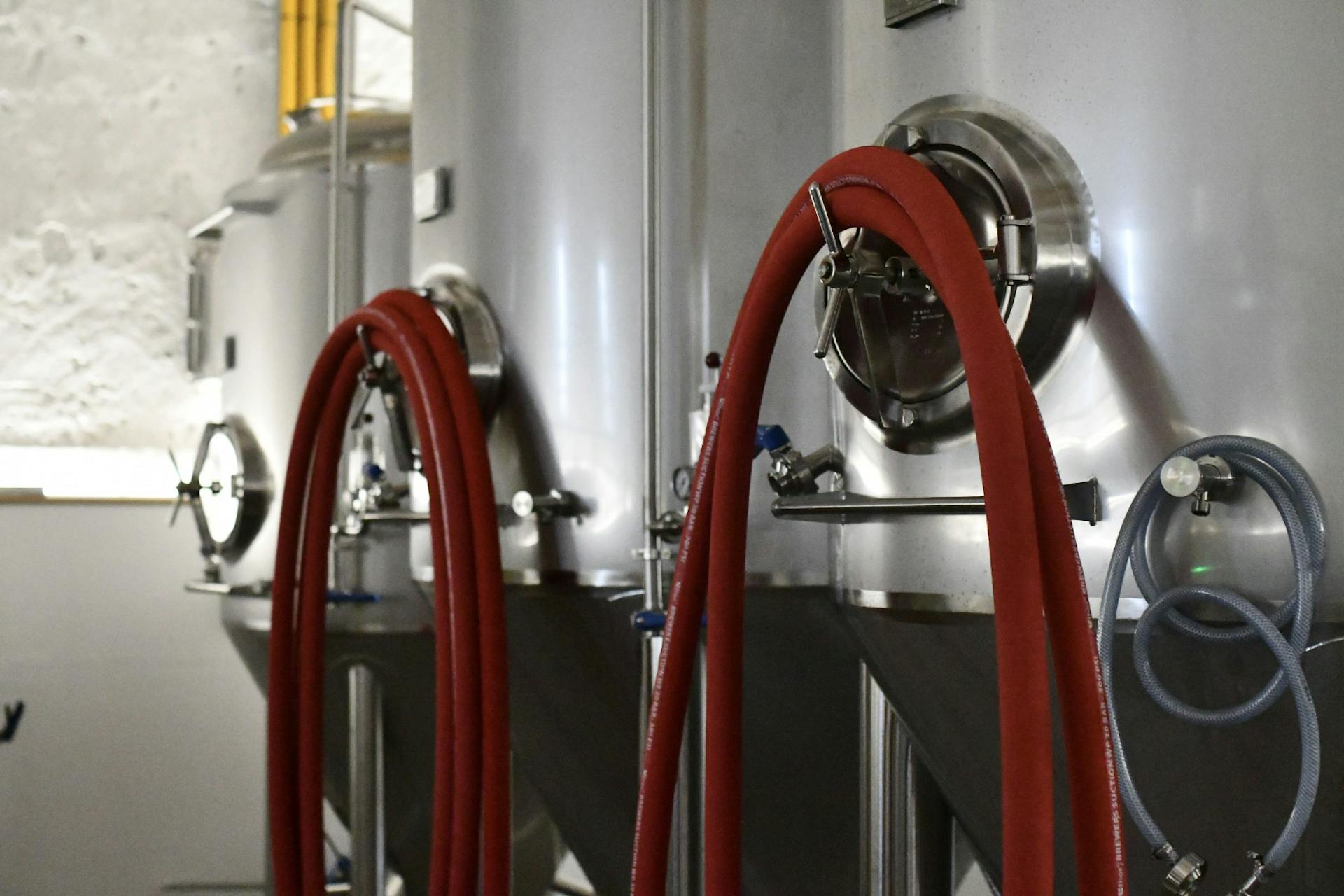
When looking at our set up we opted to invest heavily in our location, and more so in our equipment. This was cater for the beer styles we are focused on and to enable our brewers a good amount focus on recipe and beer design over back-breaking or repetitive labour. Considering kit performance, efficiencies, layout and infrastructure, and growth with minimum disruption to production meant upsizing and future-proofing parts of the brewery. It also meant always designing our processes to run as efficiently as possible.
The thought behind our brewhouse and packaging procurement was to find the best affordable equipment for our beer styles and taking as few concessions as possible. Considering why and how the brewhouse should perform, we spoke at length with manufactures on their equipment advances and process flows. As an inquisitive experienced brewer building a start-up business, we found BrauKon went the extra mile to find very specific solutions to our demanding parameters. Perhaps not entirely plug and play on the install, we undertook a little more project management. Well worth it for getting the functionality we wanted.
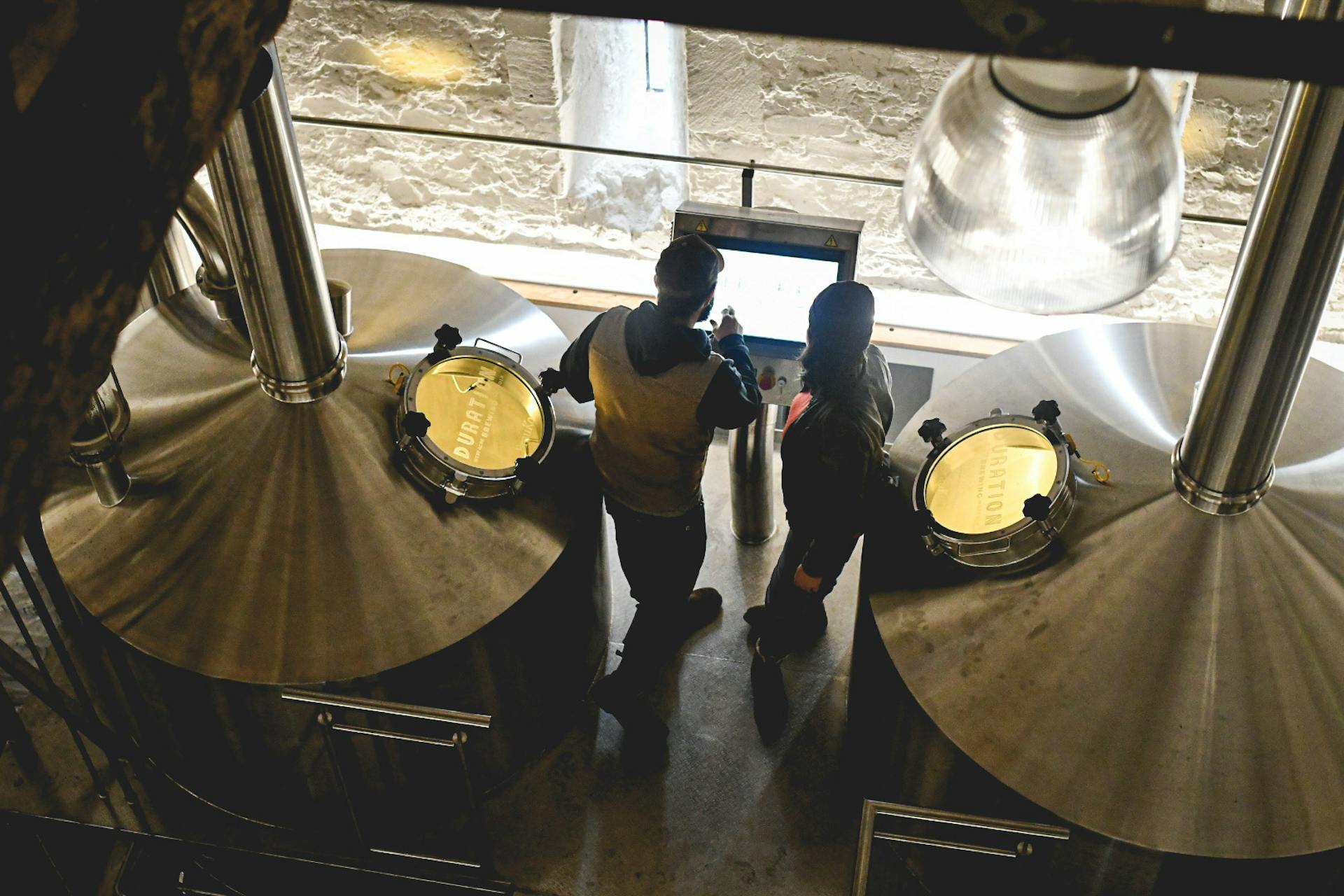
It’s no secret that German brewhouse manufacturers are rated as some of, if not the best in the world. Beer brewing is considered a profession, not a trade and to become a Brewing Engineer begins with six years hard training.
BrauKon were a delight to work with for their unrelenting attention to detail and meeting their client needs with relish. Their list of brewhouse installs and innovations in brewing speak for themselves. The like of Hillfarmstead, Allagash, Half-Acre and Live Oak have all trusted the BrauKon team for their installs.
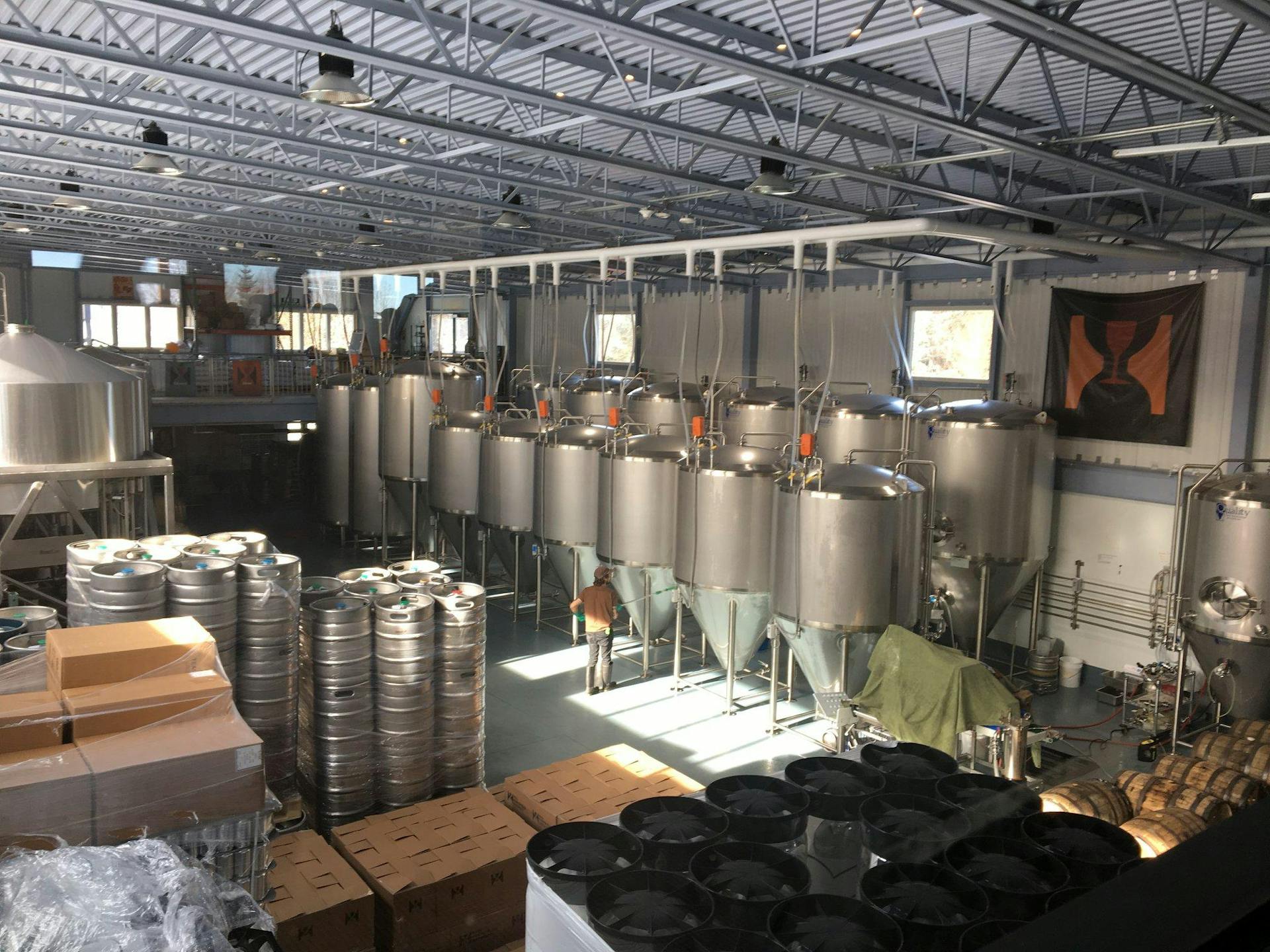
Hillfarmstead Brewery in Vermont
Here is what our project manager Andre Billing had to say on our project and our working relationship
BrauKon Client Challenge:
As the brewery will be set up in an old 16th-century stone barn, we faced some new and interesting challenges and had to find some workarounds together with our client.
BrauKon Client Solution:
Duration got in touch looking for an ideal partner to set up their new brewery in Norfolk, England. The project includes a 20hl 2-vessel brewery plus whirlpool, including state-of-the-art brewing equipment and process systems such a malting and mashing systems, our energy wort boiling system BrauKon EcoBoil or our flow-optimized mixing system BrauKon GentleMix.
We developed a unique and individual brewery for Norfolk. To meet our partner’s requirements, the brewery is only partially automated with an option to fully automate it in the future.
BrauKon Comment:
“Duration Brewing is special to us. We see them as kindred spirits, sharing the excitement for exploring new possibilities in brewing. Just like Duration our team of more than 30 brewmasters love developing new beers and Durations passion for strange yeasts and wild fermentation is very exciting to us.”
“We also share the love for new breweries in old buildings, Duration topping our Truchtlaching brewery in a barn (1878) only by about 400 years. Under these circumstances, it seems inevitable that our collaboration went as swimmingly as it did.”
– Andre Billing – Production manager, BrauKon
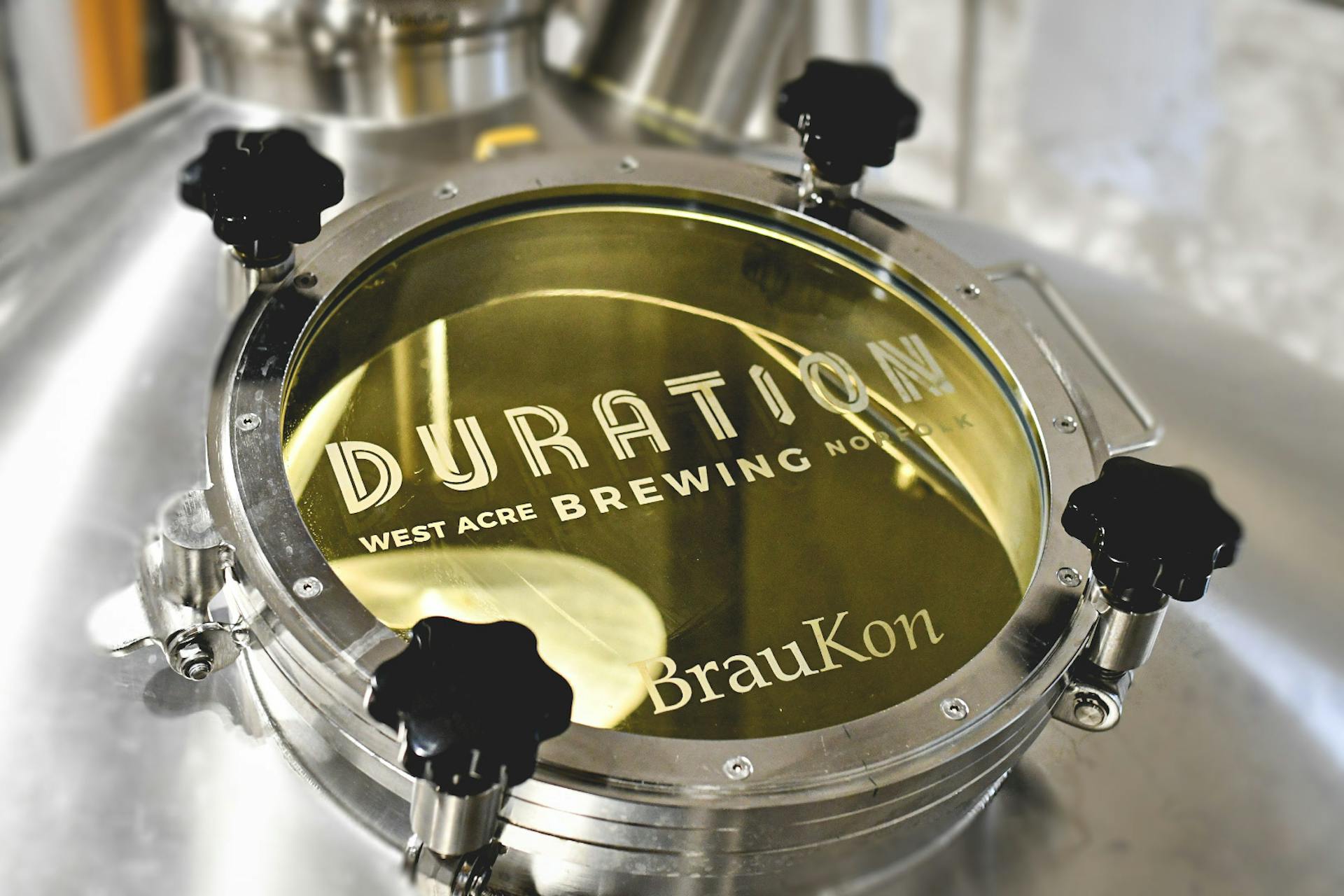
Often the energy and detail spent on the production of beer can be easily undone by inefficient packaging equipment. Resulting in volume losses, poor fill levels and worst overexposure to oxygen all bringing flavour compromise and flaw exacerbation right when you send your beer our of your control – perhaps into warm conditions to amplify the packaging flaws.
Not wishing our beer to fail at the last hurdle before it leaves our hands, we have invested in a cold store, and researched our canning line kit extensively. As the first in the UK to procure and commission a Codi Canning Line from Colorado in the UK. Large scale canning equipment with great technology. It is only past few years, with the rise of smaller producers wanting to can beer, that manufacturers have been pushed to develop quality-focused canning equipment suitable for smaller mom and pop operations.
Many small scale canning lines still use rudimentary tech long used by home brewers who by necessity are a little more willing to opt for open fill “wand” style apparatus that also exposes beer to oxygen. The three main killers to beer we know are warmth, light and oxygen. Oxidised beer particularly bad on heavy hopped beer.
The technology of larger-scale canning equipment via counter pressure, i.e. filling the cans in an enclosed environment before seaming the lid has only recently extended to small scale equipment.
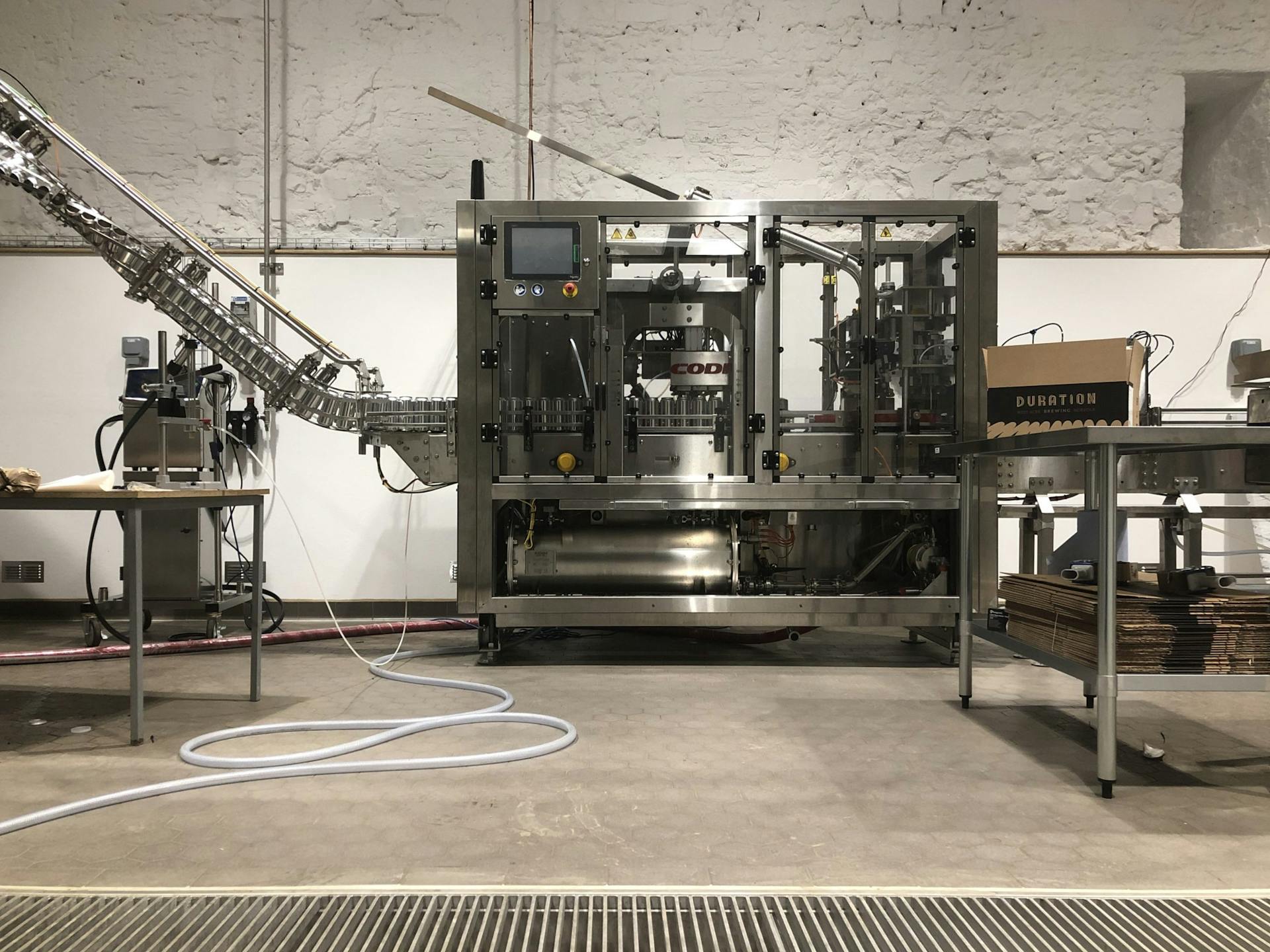
Codi canning set out to bring large beer packaging technology to a smaller scale, in a way doing what Apple did for computers and mobile phones – creating all the components used in-house, though in this case done through conveyance systems, depalletizers and can filling apparatus rather than hardware and software. By bringing proven large-scale technology to the small-scale Codi are setting a precedent for what canning can and should be at smaller scale levels.

We have a three-head counter pressure canning line. Filling 25-30 cans per minute in an enclosed environment purging with CO2 and doing away with filling wands. Each can gets a twist rinse using air and gravity when coming off the depalletizer. A de-ionized air tunnel blows out dust and debris from the can on the twist. An in-house manufactured precise mechanical driven can seamer along with the depalletizer manufactured by Codi integrates perfectly with the canning line. Plus all conveyance systems and lines manufactured by Codi can be controlled by their touch screen interface.
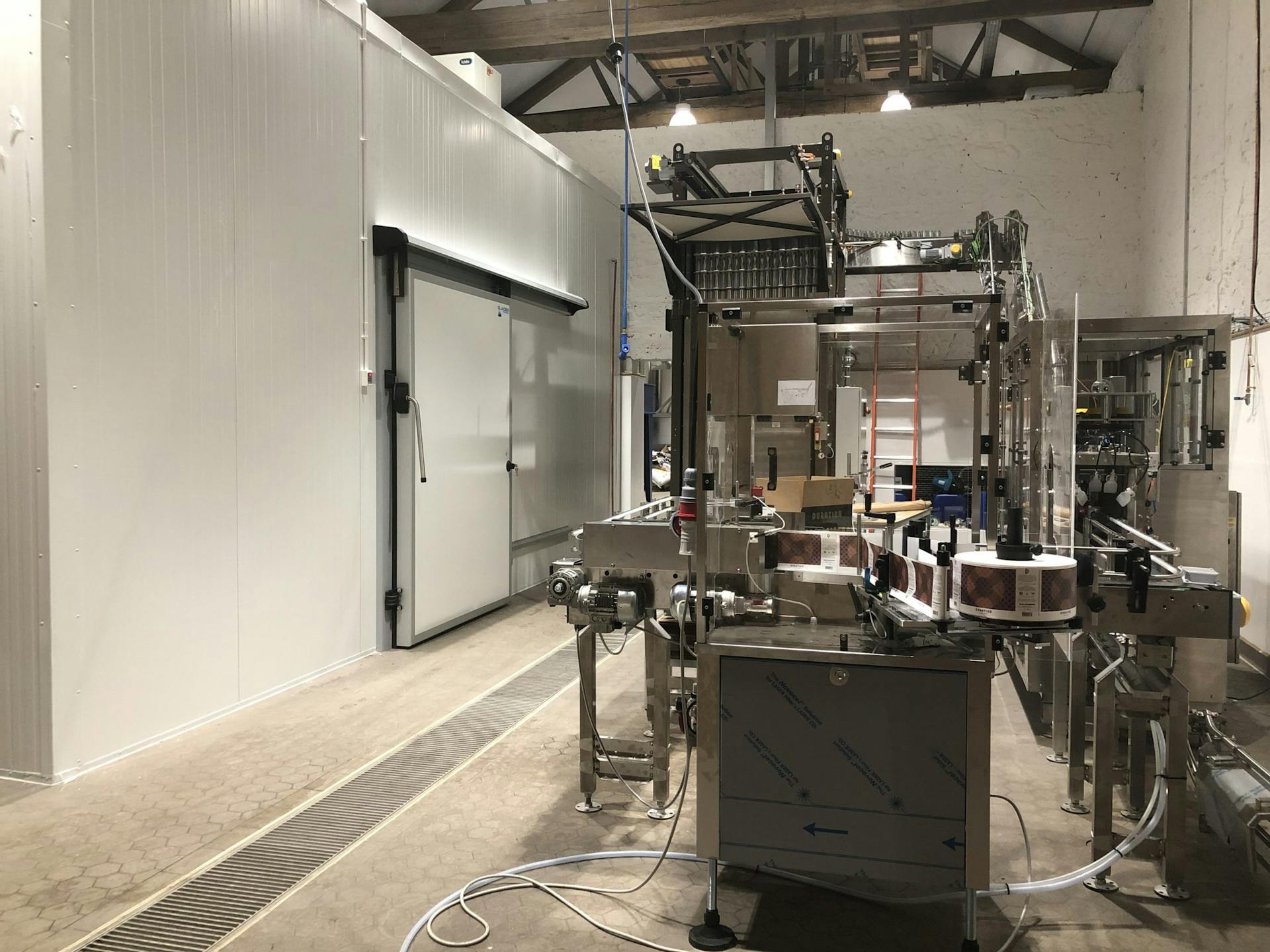
Codi Client Challenge
There is currently a major push away from open-air or gravity filling cans. Counter pressure filling becoming more prominent in breweries and other drinks packaging facilities across the UK. Producers are realising the importance and benefits that counter-pressure filling brings. Low dissolved pick-up, the ability to shift for longer, the control over the fill speeds all add to a quality of the end product in the can.
Counter pressure filling and consistent production quality were key drivers for Duration beer when considering a canning line for their new build brewery. That’s why Core Equipment had no hesitation in recommending the CODI CCL 45 counter pressure canning system.
Codi Solution
Duration decided to go for a fully automatic canning line starting with an automatic depalletizer, twist rinse system with a water rinse, 1800 can per hour filling and seaming machine, rinse/dryer and labelling station. With the speed of the CODI line, the obvious choice was to build in a fully automatic depalletizer to remove labour input and unnecessary bottlenecks at the front end of the line. Duration is going to be filling both 330ml and 440ml cans through the line with the option of 500ml cans at a later stage, and the versatility and ease of can size changeovers made the CODI the obvious choice, with no change parts required and the filling machine built to Durations specification.
Codi Comment
“This is a really exciting opportunity for Core Equipment, with the Duration canning system being one of many full lines being installed in 2019. Word has spread quickly through social media and Bates and Miranda’s relationship with many other UK breweries has resulted in numerous enquiries. The fantastic site that Duration have built will only help to showcase and promote the Core Equipment canning system to other Breweries around the UK and further afield.”
– Dan Tomlinson – Sales Representative for Core Equipment – the UK Supplier for Codi Canning Lines
We hope you enjoyed Metal. In our final post in this our foundations series, we’ll discuss the ‘grand designs’ of the site itself in – Stone. Elaborating on what the sanctions and protections over our home and surrounding area meant in terms of planning, building and services and why we felt it was all worth it to build a true forever home, exactly as we envisioned it.
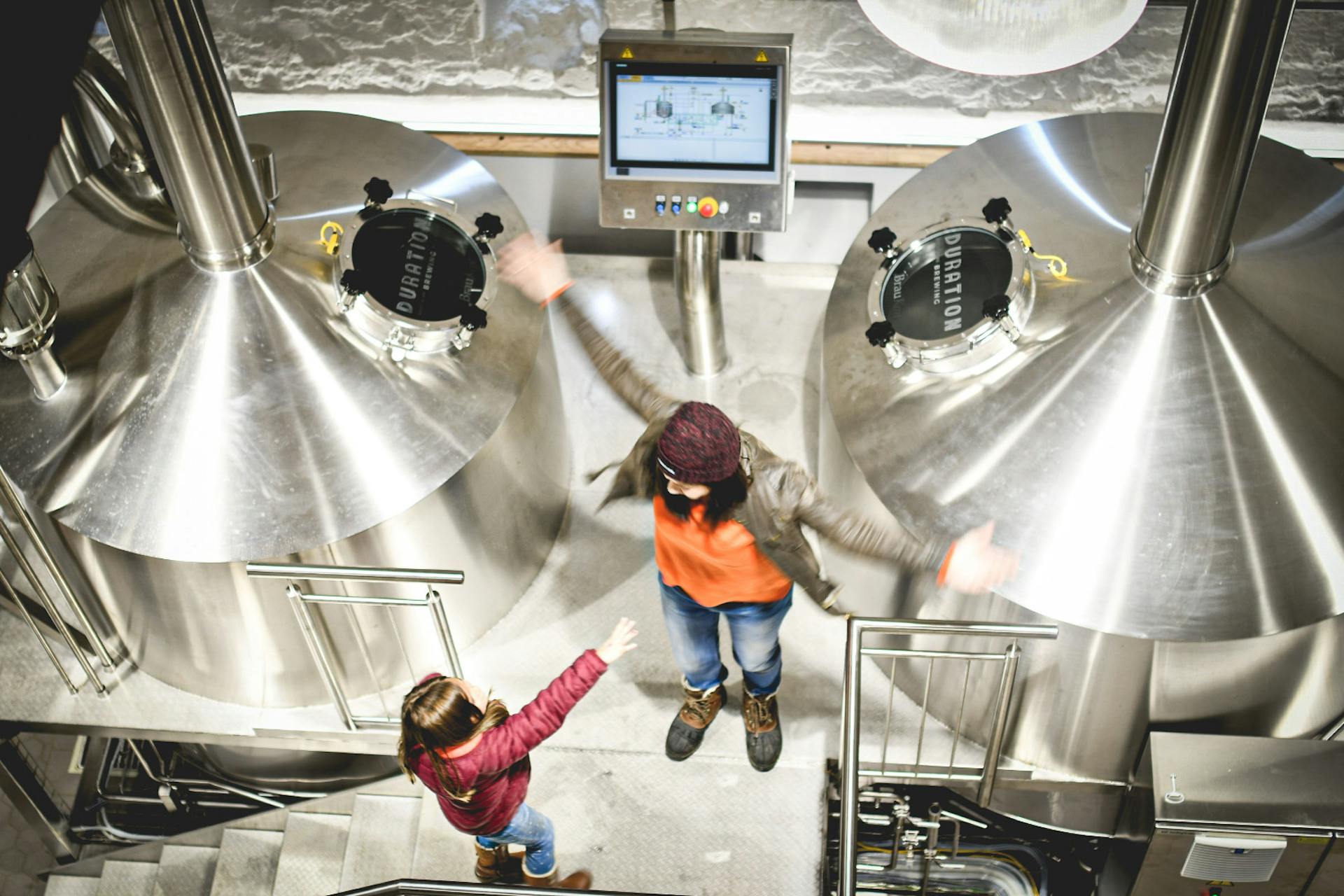
Interested to know a little more?
Bonus Section
Our BrauKon brewhouse is a 20hl system with 3 fermentation vessels and a single 40hl bright beer tank to start (we covered the additional 44hl coolship and 3 x 17hl foeders in our Wood post). Our brew day starts with a two-roller malt mill to auger crushed malt in on a chain conveyance system. Milling our malt to each brew is a small step that helps ensure malt quality.
We allowed the footprint space for a fourth vessel to add process efficiencies when production increases. We have an 80 hectolitre hot water tank or HLT for short (water known as liquor) and a 40 hectolitre cold water tank (CLT). Again an increase to allow a double brew day.
The main three brewing vessels are a dual-purpose mash/boil vessel, a lauter vessel, and a whirlpool. A big factor in choosing BrauKon was the flexibility enabling a wide variety of beer style and techniques.
The most four most basic steps in brewing: Mashing (mixing hot water with crushed grains), lautering (straining the sweet mash liquid from the grains), boiling (sterilizing, a protein break, a bittering hop addition) and whirlpooling (spinning the hop addition and protein particles out of the liquid). After these four steps on the ‘hot side’, the liquid is cooled and transferred to the ‘cold side’ or cellaring in a fermentation vessel where yeast can be pitched to start the fermentation process.
Our brewhouse helps us perform these four basic steps with various techniques to refine our beer a little further.
Temperature Controlled Mash
Our mash/boil vessel is jacketed and therefore temperature controlled. This allows us to first heat our mash to stop and enzymatic action before sending to the lauter.
Decoction Mashing
Our kit has the ability to decoct mash. For malt-forward beers like lagers, decoction mashing takes a portion of the grist in isolation from the main mash and brings it to a boil (grains and all) to enhance ‘malt’ flavour.
Turbid Mashing
Wilder yeast strains, bacterium or Brettanomyces prefer long-chain food sources. A turbid mash can leave wort starchy and milky in appearance hence ‘turbid’. A low-temperature mash can release the sugars from the grains with minimal conversion keeping the long-chain starches present that the wilder yeasts can thrive on over a longer period. Turbid mashing is popular with lambic brewing techniques and so ideal for our spontaneous, mixed culture and slower beers.
Whirlpool
We show the hops love via our whirlpool and with a hop cannon to dry hop with. A big charge of hops for both aroma and flavour can be added in the whirlpool. The more we dig into hop research the more we feel these hops if added at a slightly lower temperature than boiling (ie 80-85C rather than 100C) can contribute much more oil – the aroma and mouth feel contributors, and much less bitterness or astringent qualities. Normally this is pretty tough to do without rigging up the whirlpool or by adding cold water at the end of the boil (liquor backing). We opted to add an oversized Kelvion heat exchanger between our boil kettle and whirlpool. Chilling the wort to a precise overall wort temp before releasing it back to the whirlpool and adding hops. Thereby turning the humble whirlpool into a more precise instrument for hop extraction.
Energy Savings
Our Braukon brewhouse helps be sustainable and more efficient in many ways. As well as refinement to the beer for the sake of the beer, we are being as energy efficient with all ingredients and processes and creating as little waste as possible. Helpful for both our gross profit and for the clear benefits to the environment.
Condensate Hot Water Recovery
Our boil vessel is a steam jacketed vessel that creates a lot of evaporation in steam. We capture our condensate and pipe it back to our HLT recouping 100-200 litres per brew of perfectly useable distilled water. The combi mash/boil vessel is energy-saving in that it is only one vessel to heat, it’s full jacket retains heat between mash back to boil, thereby taking less energy to heat the boil.
DMS Break
Some unwanted off-flavours come when the boil hasn’t reach optimum temperature, allowing Dimethyl sulfide (DMS) a sulfur compound to form. You know it when you taste a creamed corn flavour in poorly made lagers. We can pull off and turbo heat a portion of liquid during our boil to then spray over the boil at a scalding hot temperature causing a DMS break – removing the sulphuring compound and eliminating the ‘corny’ off-flavour.
Main Controls
We control all of these actions via a Siemens Brau-control integrated into the brewhouse platform. This control platform also controls all the fermentation vessels (FVs) in our cellar letting us monitor and control our beer with a sharp eye during fermentation. By keeping precise control of our cellar, we can keep our yeast happy as well as making sure we hit our targeted fermentation temps. Thus keeping our beer and operation procedures consistent beer to beer.
All of these processes and innovations in the brewhouse will help us in creating beautifully balanced beers, getting better malt extraction (from not liquor backing), getting more from the hops (by controlling whirlpool temperature and using a hop cannon) and brew wort to suit the beer style through a regular, decoction or turbid mash process.
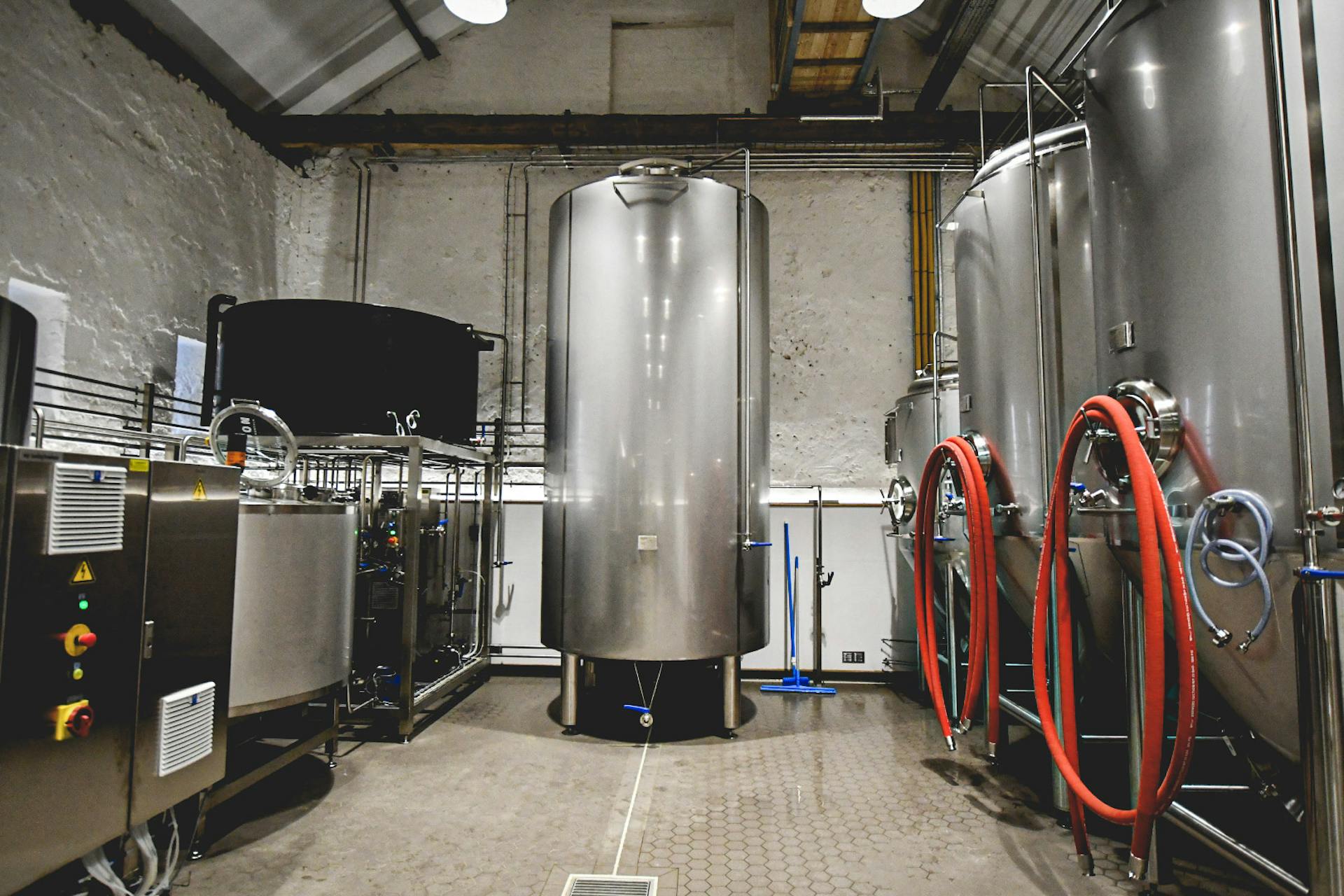
We hope you enjoyed a glimpse into the Metal of Duration. Built, we hope to produce more precise, better-made beers using modern efficiencies for less waste. Allowing our craft to show in a focused attention to our beer design and ingredient selections for beautifully balanced produce. Our kit will enable consistency in both our fresh, hop and malt focused beers and in our wilder ales more tart and complex aged, blended and mixed culture beers.
In spring we will open up an online calendar to book in for tours and tastings to see the brewhouse for yourself.
All Photography kindly provided by Theresa Undine (except canning line / Hill Farmstead images)
